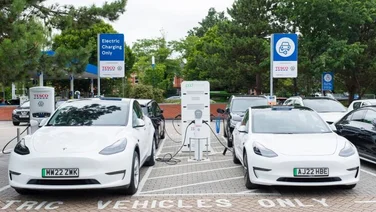- 59% of 10,021 UK adults support new electricity grid infrastructure
- 61% would be frustrated by the prevention of a clean energy project
- 8% opposed new infrastructure if it were built within five miles of their homes

59% of pollers support the construction of new electricity grid
Sixty-one per cent of people in the UK would be frustrated if a widely-supported local renewable energy project was blocked, according to a new UK-wide Opinium Research poll, commissioned by RenewableUK.
The poll, conducted from 19 – 22 April 2024, indicated that nearly two thirds (61%) of participants want new clean energy projects to go ahead where they have local support and would find it “frustrating” if new wind and solar farms were scrapped due to minority of people objecting.
This view is higher among Labour voters, with 70% of people agreeing; out of the 10,021 participants, only 19% disagreed.
This comes as the Labour government has already lifted the de-facto ban on onshore wind farms and approved three giant solar farms, as part of its long-term strategy.
Nathan Bennett, head of strategic communications at RenewableUK, said there was rising support for new wind and solar farms in the UK.
He put this down to their low cost and concerns about the UK’s energy security and the need to tackle climate change.
“What’s interesting about this polling is that support doesn’t just remain strong when people are faced with the prospect of a wind farm in their local area, but there’s now a silent majority of people who would be frustrated to see local projects stopped by small groups of opponents,” Bennett commented.
Additionally, over half of participants (59%) support new electricity grid infrastructure if it means delivering a faster roll out of economical renewable energy.
Six per cent opposed, jumping to 8% if the infrastructure were to be built within five miles of peoples homes.
Support for grid upgrades close to home also increased from 59% to 61%, in favour of a national programme of grid upgrades to support clean energy investment in local communities.
Bennett continued: “The polling on public attitudes to new grid infrastructure is also revealing, as it shows that the majority of people are happy to see a new grid built near to them if the project is part of a clear national plan, provides local funding for communities and enables investment in projects which generate low-cost power.
“We’re looking forward to making progress on this long standing barrier as soon as possible.”
As stated in their election manifesto, the Labour party said that a lack of new grid infrastructure is by far the largest obstacle when it comes to the construction of cheap, clean power.
In some areas, grid connection dates aren’t being offered until beyond 2030, past Labours target for 45% net zero.
Energy secretary, Ed Miliband MP, said: “In an unstable world, the only way to guarantee our energy security and cut bills permanently is to speed up the transition away from fossil fuels and towards homegrown clean energy.”
As part of their pledge, Labour plans to nationalise the grid through Great British Energy and ensure that everyone is afforded clean energy at a price that mitigates the cost of living crisis.






